My Father Narrowly Escaped The Nazis. Here's What I Learned While Helping Him Die.
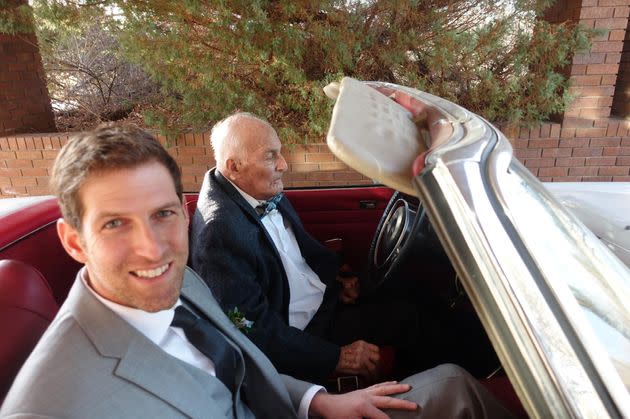
This man is a survivor, I kept telling myself, despite all evidence to the contrary. His face was gaunt, cheeks pale, hair threadbare from the most recent rounds of chemo. They had removed the lower left half of his jaw, searching for remnants of the disease, and his mouth hung slack and uneven. Even so, he kept trying to smile, to lighten the mood. His brown eyes danced when no other part of him could.
A gurgling came from his tracheotomy — a gaping hole in his gray-stubbled throat — so I cleared it, dipping a suction tube into the chasm of his neck, watching the phlegm rise up and into the machine. It was satisfying, hearing the tone change as the tube hit pay dirt and sucked the mucus from his body. It felt like I was helping.
His feeding machine whirred and hissed, pumping liquid nutrients into another tube in his stomach. Another breach in his body. The open wound that had blossomed on his neck was now quarter-size and white with discharge, somehow smelling both sour and sticky-sweet. I dabbed at it with gauze, sapping away the pus.
A survivor, I told myself again and again and again.

***
Only a few months before that, my father told me he had cancer, which was discovered during an innocuous visit to the dentist.
“I’m sure it will be no big deal,” he said, believing that what they found in his jaw could be dealt with, like so much else.
Within weeks he was in the hospital, hooked up to tubes, a hole punctured in his throat, six of his teeth and a quarter of jawbone pulled from his skull. It was one of the fastest-moving head and neck cancers that his doctors had ever seen.
I remember pulling up to the hospital, expecting to find him in recovery. Instead, I saw my two brothers and my mom crying outside.
“There was a bunch of beeping and then they kicked us out of the room,” my oldest brother told me. “They were able to revive him, but we’re still waiting to see what happens.”
He was an active 78-year-old with an incredible life behind him, hopefully more in front of him, and he wasn’t going out without a fight.
A survivor.

***
My father was born Jewish in Berlin in November of 1938.
Let that sink in.
He liked to joke that it was one the dumbest decisions of his life, and he had several “stern conversations” with his parents about the timing.
In the years after his birth, a barrage of laws and actions were unleashed to curtail German Jews’ participation in social and economic life: restrictions on transport, shopping, culture, travel, work. Bombings of his city. War. Then deportations. An uncle to Auschwitz. His grandparents to Theresienstadt.
On Feb. 22, 1943, a hammering at my grandparents’ door echoed through their small apartment. They expected the worst — the heavy boots of the SS, perhaps — but it was a neighbor with a warning.
“The Gestapo are at the corner,” she told them. “They are rounding up Jews. They are coming for you.”
In that instant, my family made their decision: Ripping the yellow stars from their outercoats, they scooped my 4-year-old father into their arms and escaped into the cold Berlin night, to go underground as Jews hiding inside Nazi Germany.
The hunt was on.
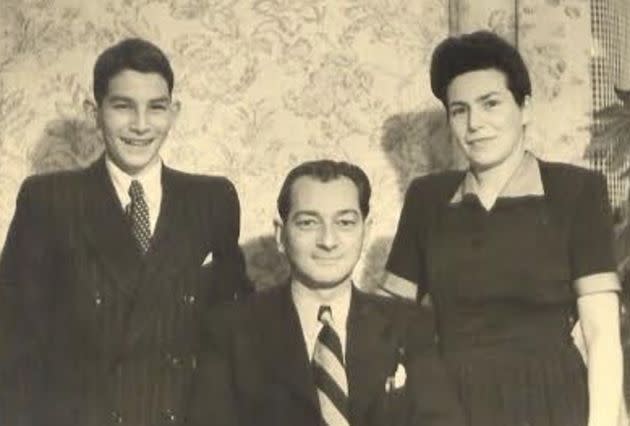
***
I got married a few months into my father’s illness. We wanted him to be a part of the ceremony, before it was too late. It was a family-only affair that took place under a borrowed chuppah in front of the fireplace in my parents’ living room in Colorado. My father threw up halfway through the vows.
Our wedding photos, though precious, show him looking 20 years older than he was, his face crooked and incomplete, his legs so weak that he could barely stand, a bow tie loose above the tubing of his trach.
Toward the end of the night, he pulled me aside.
“You should stay in the country,” he said, a reference to my wife’s Chilean heritage and our talk of living abroad, “and take care of your mother.”
My parents had married 47 years earlier, posing for their wedding photos in the cherry-red interior of my dad’s 1969 Mercedes SL convertible. He still owned the car, so my wife and I re-created the photos, matching their gaze and positions. Then my parents eased in and did the same, an aged and misshapen version of the happiness of their youth.
He said he wanted to drive the car one last time. I sat in the passenger seat with a hand on the wheel and we let him circle the driveway at 5 mph, white-knuckling it the whole way.
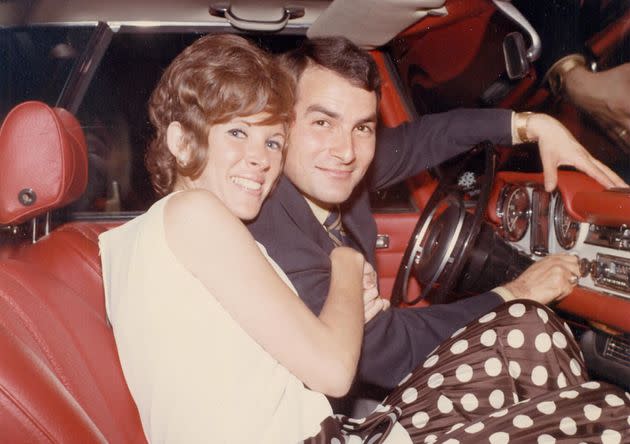
***
My father’s 5th birthday, on Nov. 27, 1943, marked one of the heaviest days of Allied bombing in the entire war. His family had been living in the cellar of a shack in a farming community outside of Berlin when nearby explosions knocked trees onto the house, trapping them inside. Knowing that rescue would come with discovery, they came up with a new backstory and identity — the Berger family — and practiced telling their story until they were rescued two days later. The deceit worked.
As the Bergers, they were given new identity cards and sent to live in Lückendorf, near where the Czech and Polish borders met in the East. They shared a house with other bombed-out families, including the wife of a Nazi officer. My dad went to school, where he learned to “heil Hitler” and sing Nazi chants. There was constant fear, as well as the stress of daily deception, magnified by a war raging around them. But their new identities allowed them to survive the following years within Nazi Germany, while losing some of their closest friends and family members to the horrors of the Holocaust.
Their struggles were not over yet.
When the Russians launched an invasion of East Germany, most Germans fled in horror, but to my family the Russians were saviors. It meant they had survived the Hitler time. Little did they know how brutal those forces would be. Over time, Russian troops gave way to a newly installed government, and communist East Germany was born.
At the communists’ behest, my grandfather rebuilt a textile factory into one of the area’s largest employers. When the government later wanted to nationalize the factory, they arrested him and his co-directors for treason. (The charges stemmed from not handing in precious metals following the war.) After a public show trial, my grandfather was sentenced to six years in communist prison.
My grandmother received word that she too was to be arrested. My grandfather told her: “If you have a chance to get to America, go! When I get out, I will find you.”
So she rode a borrowed bicycle to my dad’s school and pulled him out of chemistry class. Once again they were on the run, this time attempting to escape the authorities as they made their way to West Berlin.
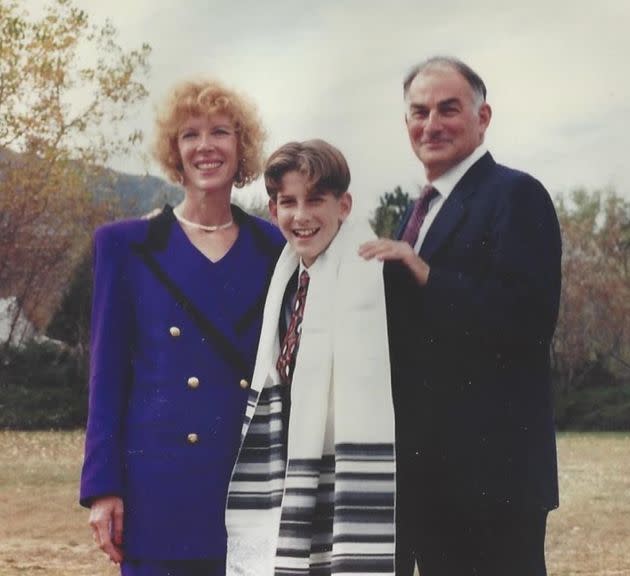
***
The cancer spread and spread, and within a few months the treatment options were wearing thin. The chemo had helped but hadn’t eliminated the disease, and my father was weaker as a result. A radiation face mask left him burned and overwhelmed. At a low point, he brought up Colorado’s legislation on the right to die, an idea previously unfathomable for someone who had lived through so much.
Meanwhile, we spent the time together as best we could. Friends and extended family came to visit, ostensibly to say goodbye. We watched movies at night. I tried to keep it light — dumb humor, new Pixar films — but he was finding little joy. He wanted to travel but there was just no way. Our conversations became deeper. His options were narrowing. He was running out of time.
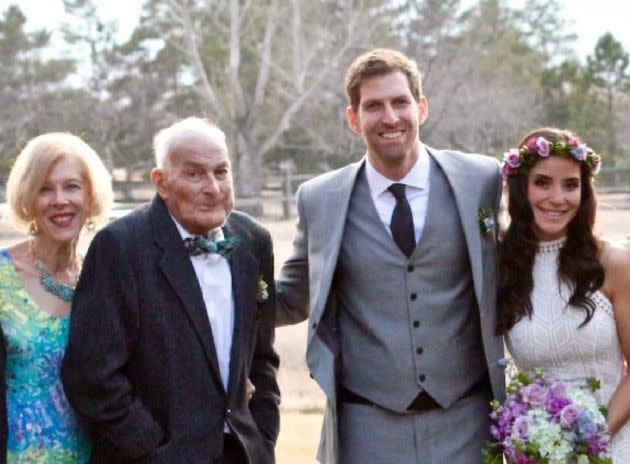
***
My dad knew only four words of English when he arrived in America: “cowboy,” “sweetheart” and “chewing gum.” He was a skinny 15-year-old who had spent the previous year in a refugee camp, but when his mom found work as a live-in housekeeper in Los Angeles, he was suddenly a junior at Beverly Hills High School. He went to an after-school program to improve his English. He got a job at Henry’s Camera to support the family. He helped run the photography club at BHHS. He graduated with the grades, but not the money, for college.
After two years at Los Angeles City College, he became student body president. He won a debate with the line “Maybe you can’t understand my accent, but you know the other guy is full of shit.”
He was then able to transfer to the University of California, Los Angeles, and received a degree in nuclear engineering with a minor in philosophy. He spent the next 25 years in varying executive roles for IBM, before transitioning to a new company in Colorado. I was 5 when we moved to Boulder.
His new venture was a computer storage startup, and he molded it into one of Forbes’ fastest growing companies in America, with more than 1,000 employees. At the height of his newfound business success, my mother made a deal with him: Every time he appeared in a newspaper or magazine, he had to take out the cat shit.
“It keeps you humble,” she liked to tell him as he bent over the litter box. “Keeps you humble.”

***
As his health continued to fade, I stayed in my parents’ home, helping my mom care for him. I took three months of family leave from my teaching job, and we started in-home hospice care shortly before that time was up. On the night before I was set to head home, he looked at me intently.
“I’m fading, Andrew,” he said.
I didn’t have the heart to lie. To tell him otherwise.
“Are you scared?” I asked.
He paused, looking away. Evaluating.
“No.”
We shared a hug, a long look into each other’s eyes. Once so full of wisdom and joy, his brown eyes now held only pain. I kissed his forehead, and we hugged again. I think we both knew it would be our last. It was time.
Two days later I got the call.
***
In the weeks before he died, my dad managed to sit at his desk one last time, tasked with writing what would be his own eulogy. He typed slowly, deliberately, one finger at a time, eager not to have to make edits.
At his funeral service, attended by hundreds, I read the words he had written for himself. Through my tears I heard the laughter and applause.
His self-eulogy began: “Some time ago, someone asked me what I would like to hear at my own funeral. After thinking about it, my answer was: ‘Look, he’s moving!’ That seems not to have happened, and here we are.”
Later in the speech, he mentioned what he was most proud of: his family, his marriage of 47 years, his three sons. But in his own touching way, he couldn’t resist a joke: “I’m proud of raising three kids who don’t know the meaning of binge drinking or the inside of a jail, or the meaning of excessive drug use. Of course, they don’t know the meaning of a lot of words, but I’m proud of them anyway.”
We were proud of him, and always will be. He will live on through the memories we share, and the stories we tell.
A survivor, through and through.
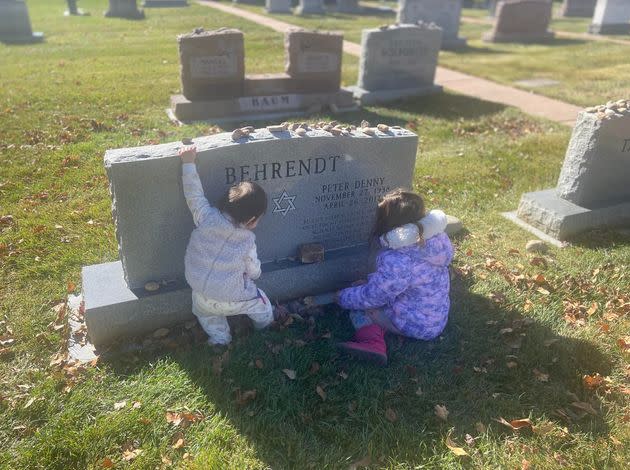
***
I wouldn’t change a thing. Not even the suffering. In a weird way, I’m not sure he would have either. I think he understood the incredible life lessons it taught me. I think he felt proud of the life he had lived. All of the hardest moments — the barrage of bodily failures, the toughest conversations, the harrowing decisions to make — left a lasting impression that will forever shape me into a better man. A better father. I’ve learned that the nature of life is you have to expect things to go wrong on occasion. You have to be prepared to encounter suffering. Certainly aging. Definitely death.
I had always imagined my father dying of old age, and it scared me as much as any illness did. His was a fast burn instead of a slow fade, and at least we had a timeline. It helped us put our priorities in order. It helped us laugh a little harder when we could.
I have two daughters now. I wish he could have met them. I wish they could have met him. That is one of my biggest regrets. I brought them to visit his gravesite recently. The flatirons of Boulder loomed over his name, etched into granite. “Beloved Husband, Father, Opa, & Mentor, known for his leadership and quick wit. A Holocaust survivor, world traveler, and photographer, who lived in the present and looked to the future.”
Because of him, the future is bright.
Andrew Behrendt is a writer and teacher in Colorado. He is currently working on a book about his family’s life in Germany and America. Follow him on X (@wordsbyajb) and on Instagram (@travellikeyoumeanit). You can see his father’s photography at peterbehrendtphotography.com.
Do you have a compelling personal story you’d like to see published on HuffPost? Find out what we’re looking for here and send us a pitch at pitch@huffpost.com.

